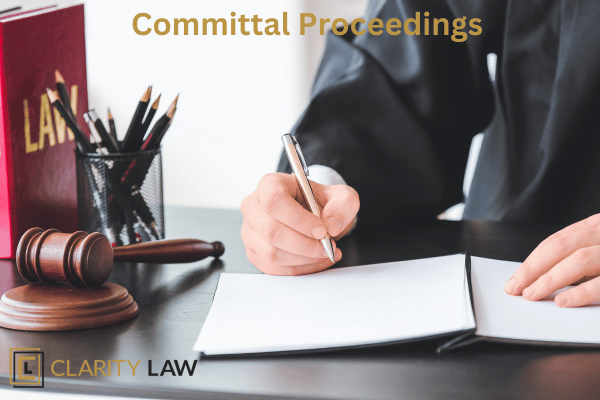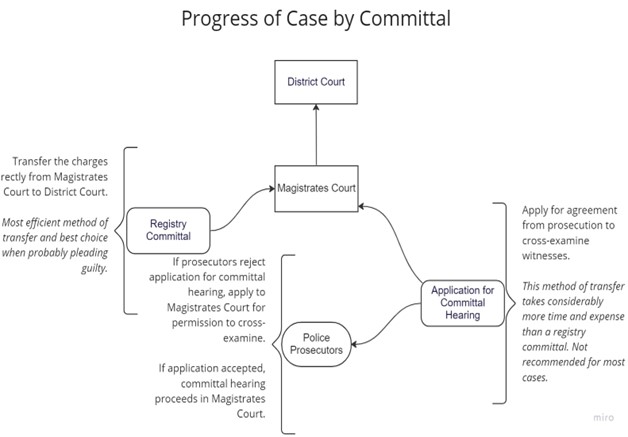
Most charges in Queensland begin and end in the Magistrate Court. The more serious charges, however, must be transferred from the Magistrates Court to the District/Supreme Court.[1] This is called ‘committing’ them. The transfer process is according to this chart:

Steps Before Committal
Full Brief of Evidence and Case Analysis
The “full brief of evidence”, is an assembly of (most of)[2] the evidence the police possess that they say proves the charges against a defendant. This evidence must be given to the defendant (or Clarity Law) before his or her case is committed to the District/Supreme Court. We then assess the evidence to determine whether the evidence is sufficient to prove the charges.
Case Example
We had a client who was charged with grievous bodily harm,[3] which is a charge that must be heard in the District Court. However, after we assessed the medical evidence, it became apparent that evidence supported a less serious charge of assault occasioning bodily harm.[4] We wrote to the prosecution pointing out this discrepancy, and argued the charge should be downgraded. The prosecution accepted this argument, and the charge was downgraded. This meant that the case stayed in the Magistrates Court, which was less costly to the client (in terms of legal fees) and exposed the client to lower maximum penalties.
Confirm Instructions
After we have analysed the evidence (with instructions from the client in mind), we comprehensively explain the evidence, what charges we think can or cannot be proved, and then explain the options and seek directions on what to do next.
The Committal Process
There are two ways[5] of transferring a case from the Magistrates Court to the District/Supreme Court, as explained below.
Registry Committal
This process is a matter of completing the correct paperwork, identifying which charges can be committed, and forwarding the paperwork to the prosecution, who then sign their side of it and file it with the Magistrates Court. This option is the fastest, the least costly, and is best suited to those who are going to plead guilty.
Application for Committal Hearing
This process is much more complicated than the registry committal.
It requires the preparation of a written application, given to the prosecution, which states:
-
Which witnesses we propose are called and cross-examined,
-
The issues we aim to explore with the witness,
-
the reasons we want the witness called.
The questions we ask the witness will be limited to the issues identified in our written application.
The prosecution can accept or reject our application. If it is accepted, then the case is listed for a committal hearing in the Magistrates Court. If the application is rejected, we can still apply directly to the Court and make arguments why the application should be accepted. If the Court rejects it, the application fails. If the Court accepts it, then the case is listed for a committal hearing. It is very important we do not press for a committal hearing to only fish for information; if a complainant or other witnesses are made to come to court to give evidence before the trial, this can greatly reduce the benefit of a guilty plea if a defendant pleads guilty later.
The main purpose of a committal hearing is to test whether the evidence is sufficient to put a defendant on trial for any indictable offence. It is also for a defendant to properly understand a case against him and clarify important ambiguities in the full brief of evidence.
Case Example
A defendant is accused of murder. The circumstances are she was having an argument with a friend near the side of the road. She threatened to stab him and he then stepped out onto the road and was hit and killed by a car. The prosecution argued that, if not for her threatening actions, the man would not have died, and it was therefore murder. The defence argued the prosecution had no evidence to prove it was the defendant who caused the deceased man to step out onto the road, and even if she did, that is not sufficient to establish a charge of murder. The magistrate threw out the murder charge on the basis there was not sufficient evidence that a jury could convict the accused.
An application for a committal hearing is best suited to those cases where a defendant is quite sure he will plead not guilty in the higher court, or the prosecution case is so weak it is worth challenging in the Magistrates Court.
After Committal
Once the case is committed to the higher court, the case and evidence are transferred from the police prosecutors to the Office of the Director of Public Prosecutions (ODPP for short). The ODPP then decide whether to indict (that is charge) the defendant on the same charges, or different charges. Sometimes this will consist of additional charges (if there is something police may have missed, based on the evidence), or fewer charges. It must be assessed on a case-by-case basis whether the charges are likely to change or remain the same.
The ODPP is expected to present the charges to the District or Supreme Court within six months of the committal.
Conclusion
Deciding how to proceed at the committal stage is an important step in every criminal case. This is a decision that should be made with the assistance of expert legal advice. We at Clarity Law have the experience and expertise required to help you navigate through this tricky process.
[1] Justices Act 1886(QLD),sections 108 to 134.
[2] There is some evidence the prosecution is not obliged to give, but will give if requested.
[3] With a maximum penalty of 14 years.
[4] With a maximum penalty of 7 years.
[5] There are technically three ways. The third way is a “full hand up” committal, but this procedure is rarely used.






